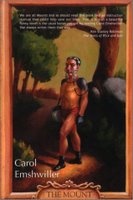Didion, Joan. Miami. New York: Simon & Schuster, 1987.
 This book and the things it has to say swam over me in a daze the weeks I read it, those leading up to the Writers' Conference that's consumed my life all summer thus far. Proper nouns are packed on the page. (I was going to drop a simile in the middle of that sentences, but I'm unable to find any more suitable than "like sardines," which is of course unsuitable because it's a cliche.) It's very hard to keep track of the mess of people and places she covers.
This book and the things it has to say swam over me in a daze the weeks I read it, those leading up to the Writers' Conference that's consumed my life all summer thus far. Proper nouns are packed on the page. (I was going to drop a simile in the middle of that sentences, but I'm unable to find any more suitable than "like sardines," which is of course unsuitable because it's a cliche.) It's very hard to keep track of the mess of people and places she covers.What kept me going was Didion's sentences, which are, as always, beautiful. I think with this book more than any other of hers I've read what she's leaning on most heavily is the periodic sentence; the one that saves for the end the sentence's most important point. It's such an elegant form in the way it lets commas drop like dead animals from the reaching boughs of her sentences:
There were in Washington during the Reagan administration a small but significant number of people for whom the commitment to American involvement in Central America did not exist exclusively as an issue, a marker to be moved sometimes front, sometimes back (180).Such a ballsy embrace of the passive voice, if balls can in fact embrace something. But there are hundreds of such sentences in the book, many of which sprawl even further down a page than this one does. It's stunning in the literal way, slapping you in the face and leaving you a little dumb at yourself.
Here's another passage, one more toward Didion's general point and message, one that, because I ashamedly don't recall much of the first four-fifths, is also from rather late in the book. (This comes after a bit about an invitation she (Didion) has received which asks for money to help freedom fighters, saying that even a few hundred dollars is enough to blow up Soviet planes.)
The narrative in which a few hundred dollars spent on plastic explosives could reverse history [...] was the same narrative in which meetings at private houses in Miami Beach had been seen to overturn governments. This was that narrative in which the actions of individuals had been seen to affect events directly, in which revolutions and counterrevolutions had been framed in the private sector; that narrative in which the state security apparatus existed to be enlisted by one or another private player (206).It's very likely that the United States has trained more terrorists than any other country in the world. But doesn't everyone know this already?





